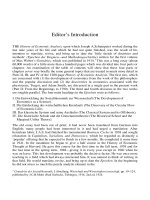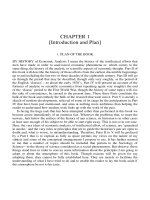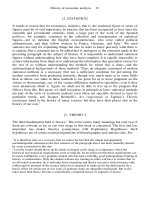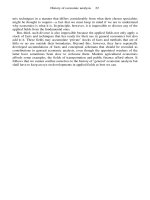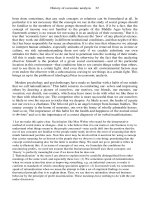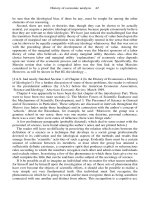History of Economic Analysis part 6 docx
Bạn đang xem bản rút gọn của tài liệu. Xem và tải ngay bản đầy đủ của tài liệu tại đây (64.67 KB, 10 trang )
[2. STATISTICS]
It stands to reason that for economics, statistics, that is, the statistical figure or series of
figures must be of vital importance. In practice this has been recognized at least since the
sixteenth and seventeenth centuries when a large part of the work of the Spanish
políticos, for example, consisted in the collection and interpretation of statistical
figures—not to mention the English econometricians, who were called political
arithmeticians, and their fellow workers in France, Germany, and Italy.
1
We need
statistics not only for explaining things but also in order to know precisely what there is
to explain. But a comment has to be added that is analogous to the comment made in the
preceding paragraph on the subject of history. It is impossible to understand statistical
figures without understanding how they have been compiled. It is equally impossible to
extract information from them or to understand the information that specialists extract for
the rest of us without understanding the methods by which this is done—and the
epistemological backgrounds of these methods. Thus, an adequate command of modern
statistical methods is a necessary (but not a sufficient) condition for preventing the
modern economist from producing nonsense, though very much more so in some fields
than in others: our stake in these methods is too great for us to leave judgment on the
virtues or shortcomings, say, of the variate-difference method to specialists, even if they
were unanimous about it. Again, we shall not be able to live up to the program that
follows from this. But again, we shall recognize, in principle at least: statistical methods
are part of the tools of economic analysis even when not specially devised to meet its
particular needs; and Jacques Bernoulli’s Ars conjectandi or Laplace’s Théorie
analytique stand in the history of many sciences but they have their places also in the
history of our own.
2
[3. ‘THEORY’]
The third fundamental field is ‘theory.’ This term carries many meanings but only two of
them are relevant so far as our own usage in this book is concerned. The first and less
important one makes theories synonymous with Explanatory Hypotheses. Such
hypotheses are of course essential ingredients of historiography and statistics also. For
1
It is therefore only as a curiosum that we notice the fact that the simple and apparently
unchallengeable statement in the first sentence of the paragraph above has been staunchly denied
by some economists to this day.
2
Lest the reader should throw up his hands in despair at the range of competence which the
historical and statistical requirements seem to indicate, let me point out that these requirements can
be easily fulfilled by every graduate student who has had a tolerably good undergraduate training in
history or mathematics. Only the student without any training in either will have to realize that, as
an all-round economist, he is suffering from a handicap and that he can move with assurance only
within narrow portions of the science unless he is prepared to make up for his deficiencies by a
heroic effort for which one or two years of graduate study are altogether inadequate. But it also
takes more than that to become a scientifically competent lawyer or engineer or doctor.
History of economic analysis 12
instance, even the most fiercely factual historian, economic or other, can hardly avoid
forming an explanatory hypothesis or theory, or several explanatory hypotheses or
theories, on the origins of towns. The statistician must form a hypothesis or theory, say,
on the joint distribution of the stochastic variables that enter into his problem. All that
needs to be said about this is that it is an error—though a widespread one—to believe that
the sole or main business of the economic theorist consists in formulating such
hypotheses (some may wish to add: out of the blue sky).
Economic theory does something entirely different. It cannot indeed, any more than
can theoretical physics, do without simplifying schemata or models that are intended to
portray certain aspects of reality and take some things for granted in order to establish
others according to certain rules of procedure. So far as our present argument is
concerned, the things (propositions) that we take for granted may be called
indiscriminately either hypotheses or axioms or postulates or assumptions or even
principles,
1
and the things (propositions) that we think we have established by admissible
procedure are called theorems. Of course a proposition may figure in one argument as a
postulate and in another as a theorem. Now, hypotheses of this kind are also suggested by
facts—they are framed with an eye to observations made—but in strict logic they are
arbitrary creations of the analyst.
2
They differ from the hypotheses of the first kind in that
they do not embody final results of research that are supposed to be interesting for their
own sake, but are mere instruments or tools framed for the purpose of establishing
interesting results. Moreover, framing them is no more all the economic theorist does
than framing statistical hypotheses is all that the statistical theorist or in fact any theorist
does. Just as important is the devising of the other gadgets by which results may be
extracted from the hypotheses—all the concepts (such as ‘marginal rate of substitution,’
‘marginal productivity,’ ‘multiplier,’ ‘accelerator’), relations between concepts, and
methods of handling these relations, all of which have nothing hypothetical about them.
3
And it is the sum total of such gadgets—inclusive of strategically useful assumptions—
which constitutes economic theory. In Mrs. Robinson’s unsurpassably felicitous phrase,
economic theory is a box of tools.
The rationale of this conception of economic theory is very simple and the same as in
all other departments of science. Experience teaches us that the phenomena of a given
class—economic, biological, mechanical, electrical, and what not—are indeed individual
occurrences each of which, as it occurs, re-
1
By ‘principle’ we shall mean in this book any statement that we (or the authors under discussion)
do not propose to challenge. But it may be a proposition that we (they) have established as well as a
proposition that we (they) have postulated or assumed. The same holds for the objectionable term
‘law,’ the emergence and use or misuse of which will have to be carefully considered: we speak of
the ‘law’ of decreasing returns or of Keynes’s ‘law’ of the propensity to consume, which are
assumptions, but also of the Marxist ‘law’ of the falling rate of profit, which is a proposition that
Marx thought he had established.
2
To use J.H.Poincaré’s simile: tailors can cut suits as they please; but of course they try to cut them
to fit their customers.
3
Example: theoretical mechanics proceeds upon a number of assumptions (or hypotheses in this
sense); but evidently the list of these assumptions is not the whole of theoretical mechanics but only
constitutes, where explicitly assembled, its first chapter.
Interlude I 13
veals peculiarities of its own. But experience also teaches us that these individual
occurrences have certain properties or aspects in common and that a tremendous
economy of mental effort may be realized if we deal with these properties or aspects, and
with the problems they raise, once and for all. For some purposes it is indeed necessary
to analyze every individual case of pricing in an individual market, every case of income
formation, every individual business cycle, every international transaction, and so on. But
even where this is necessary we discover that we are using, in each case, concepts that
occur in the analysis of all. Next we discover that all cases, or at least large sets of
individual cases, display similar features which, and the implications of which, may be
treated for all of them together by means of general schemata of pricing, income
formation, cycles, international transactions, and so on. And finally we discover that
these schemata are not independent of one another but related, so that there is advantage
in ascending to a still higher level of ‘generalizing abstraction’ on which we construct a
composite instrument or engine or organon of economic analysis—though not the only
one, as we have seen—which functions formally in the same way, whatever the economic
problem to which we may turn
4
it. Richard Cantillon’s
5
work is the first in which
awareness of this last truth is clearly discernible, though economists took over a century
to realize all its possibilities—Léon Walras was in fact the first to do so (see below Part
IV, ch. 6, sec. 5b).
Although it is neither possible nor desirable for us to embark upon an
epistemology of economics and although some of the topics pertaining to
that field will receive attention both in the subsequent chapters of this Part
and in all the subsequent Parts, it will be helpful to insert here a few
additional remarks in the hope that they will do something to scale down
possible barriers between myself and my readers.
First, then, a qualification should be added to the preceding argument
about the nature and functions of economic theory. This argument ran in
terms which are applicable, substantially at least, to all sciences that have
any all-purpose apparatus of analysis. But there are limits to this
parallelism and the most important of them are represented by the two
following facts. Economics lacks the benefits that physics derives from
laboratory experiments—when economists talk about experimenting they
mean something quite different from experimenting under laboratory
conditions—but enjoys instead a source of information that is denied to
physics, namely, man’s extensive knowledge of the meanings of
economic actions. This source of information is also a source of
controversies that will bother us repeatedly on our journey. But its
existence can hardly be denied. Now, when we speak, for example, of
motives that are supposed to actuate individuals or groups, our source of
information may be roughly identified with knowledge of psychic
processes, conscious or
4
The statement above is a brief rendering of E.Mach’s doctrine that every
(theoretical) science is a device for effecting economy of effort (Denkökonomie).
5
See below Part II, ch. 4, sec. 2.
History of economic analysis 14
subconscious, which it would be absurd not to use, although, as I shall
never cease to emphasize, this is not the same thing as trespassing upon
the field of professional psychology—any more than stating the ‘law’ of
decreasing returns from land implies trespassing upon the realm of
physics. There is, however, also another way of interpreting our
knowledge of meanings which is more akin to logic. If I state, for
example, that—under a number of conditions—instantaneous gains of a
firm will be maximized at the output at which marginal cost equals
marginal revenue (the latter equaling price in the case of pure
competition), I may be said to be formulating the logic of the situation and
a result that is true, just as is a rule of general logic, independently of
whether or not anyone ever acts in conformity to it. This means that there
is a class of economic theorems that are logical (not, of course, ethical or
political) ideals or norms. And they evidently differ from another class of
economic theorems that are directly based upon observations, for
example, on observations as to how far expectations of employment
opportunity affect workmen’s expenditure on consumers’ goods or how
variations in wages affect the marriage rate. It would no doubt be possible
to assimilate both types of theory by interpreting the logical norms also as
‘purifying’ generalizations from observational data, if need be, from
observations that are subconsciously stored up by common experience.
On the whole, however, it seems better not to do so but to recognize
frankly that we have, or think we have, the ability to understand meanings
and to represent the implications of these meanings by appropriately
constructed schemata.
Second, the foregoing explanation may have done something toward
exonerating me from the suspicion that I am tainted with Scientism. This
term has been introduced by Professor von Hayek
6
to denote the uncritical
copying of the methods of mathematical physics in the equally uncritical
belief that these methods are of universal application and the peerless
example for all scientific activity to follow. This history as a whole will
answer the question whether there actually has been such uncritical
copying of methods that have meaning only within the particular patterns
of the sciences that developed them—apart of course from programmatic
utterances that have been numerous enough ever since the awe-inspiring
successes of the physical sciences in the seventeenth century but mean
next to nothing. As regards the question of principle, there cannot be the
slightest doubt that Hayek is right—and so were all who in the nineteenth
century preceded him in uttering protests similar to his—in holding that
the borrowing by economists of any method on the sole ground that it has
been successful somewhere else is inadmissible,
6
F.A.von Hayek, ‘Scientism and the Study of Society,’ Economica, August 1942,
February 1943, and February 1944. This treatise—these articles are nothing less
than a treatise—is strongly recommended both because of the profound
scholarship of which it is the product and because it presents an excellent example
of how near to each other, in discussion of this kind, dwell truth and error.
Interlude I 15
and that the rare and unimportant cases in which this has actually been
done deserve what they get at his hands. Unfortunately this is not the real
question. We have to ask what constitutes ‘borrowing’ before we can
proceed to ask what constitutes illegitimate borrowing. And here we must
beware of an optical illusion similar to the one that makes Marxists so
reluctant to use such terms as price or cost or money or value of the
services of land or even interest when speaking of a future socialist order:
these terms denote concepts of general economic logic and seem to
Marxists to be tainted with a capitalist meaning only because they are
used also in capitalist society. Similarly, the concepts and procedures of
‘higher’ mathematics have indeed been first developed in connection with
the physicist’s problems, but this does not mean that there is anything
specifically ‘physicalist’ about this particular kind of language.
7
But this
also holds for some ‘of the general concepts of physics, such as
equilibrium potential or oscillator, or statics and dynamics, which turn up
of themselves in economic analysis just as do systems of equations: what
we borrow when we use, for example, the concept of an ‘oscillator’ is a
word and nothing else. Two circumstances combine, however, to reinforce
that optical illusion. On the one hand, physicists and mathematicians,
when they hit upon those general concepts that occurred to us only later,
not only baptized them but also worked out their logic. So long as this
logic does not introduce anything ‘physicalist’ it would be waste of effort
not to make use of it. On the other hand, students sometimes understand a
physical analogy more readily than they do the economics of the case to
be presented. Hence such analogies are often used in teaching. It therefore
seems as though the things we are accused of borrowing are merely the
reflexes of the fact that all of us, physicists or economists, have only one
type of brain to work with and that this brain acts in ways that are to some
extent similar whatever the task it tackles—the fact to which the Unity-of-
Science movement owes its existence. This does not involve any
mechanistic, deterministic or other ‘-istic’ errors, or any neglect of the
truth that ‘to explain’ means something different in the natural and in the
social sciences, or finally any denial of the implications of the historical
character of our subject matter.
Third, if economic theory is such a simple and harmless sort of thing as
I have represented it to be, the reader might wonder where the hostility
comes from that has followed it ever since it attracted any attention at all
(which was roughly since the time of the physiocrats) to this day. I shall
simply list the main headings for an answer which our story will amply
verify:
(1) At all times, including the present, in judging from the standpoint
of the requirements of each period (not judging the state of the theory
7
Hayek’s teachers, the Austrian utility theorists, by operating the concept of
marginal utility, actually discovered the calculus. It cannot be a crime to formulate
their reasoning correctly.
History of economic analysis 16
as it was at any time by standards of a later time) the performance of
economic theory has been below reasonable expectation and open to valid
criticism.
(2) Unsatisfactory performance has always been and still is
accompanied by unjustified claims, and especially by irresponsible
applications to practical problems that were and are beyond the powers of
the contemporaneous analytic apparatus.
(3) But while the performance of economic theory was never up to the
mark, that is, never what it might have been, it was at the same time
beyond the grasp of the majority of interested people who failed to
understand it and resented any attempt at analytic refinement. Let us
distinguish carefully the two different elements that enter into this
resentment. On the one hand, there were always many economists who
deplored the loss of all those masses of facts that actually are lost in any
process that involves abstraction. So far as application is concerned,
resentment of this type is very frequently quite justified. On the other
hand, however, there are untheoretical minds who are unable to see any
use in anything that does not directly bear upon practical problems. Or, to
put it less inoffensively, who lack the scientific culture which is required
in order to appreciate analytic refinement. It is very important for the
reader to bear in mind this curious combination of justified and unjustified
criticism of economic theory, which will be emphasized all along in this
book. It accounts for the fact that criticism of economic theory practically
always proceeded from both people who were above and people who were
below the level of the economic theory of their time.
(4) The hostility that proceeded from these sources was frequently
strengthened by the hostility to the political alliances which the majority
of theorists persisted in forming. The classical example for this is the
alliance of economic theory with the political liberalism of the nineteenth
century. As we shall see, this alliance had the effect of turning for a time
the defeat of political liberalism into a defeat of economic theory. And at
that time many people positively hated economic theory because they
thought it was just a device for bolstering up a political program of which
they disapproved. This view came all the easier to them because economic
theorists themselves shared their error and did all they could to harness
their analytic apparatus into the service of their liberal political creed. In
this and many analogous cases, of which modern economic theory is
another deplorable example, economists indulged their strong propensity
to dabble in politics, to peddle political recipes, to offer themselves as
philosophers of economic life, and in doing so neglected the duty of
stating explicitly the value judgments that they introduced into their
reasoning.
(5) Although really implied under one or more of the preceding
headings, we may just as well list as a separate one the view that
economic theory consists in framing unfounded, speculative hypotheses in
the first of the two meanings that were distinguished above. Hence, the
Interlude I 17
tendency quite frequent among economists or other social scientists to
rule out economic theory from the realm of serious science. It is
interesting to note that a propensity
8
of this kind is by no means confined
to our field. Isaac Newton was a theorist if he was anything. Nevertheless,
he displayed a marked hostility toward theory and especially toward
framing of causal hypotheses. What he really meant was not theory or
hypothesis of our second kind but just inadequately substantiated
speculation. Perhaps there was also something else in this hostility,
namely the aversion of the truly scientific mind to the use of the word
‘cause’ that carries a metaphysical flavor. Newton’s example may also be
appealed to in order to illustrate the truth that dislike of the use of
metaphysical concepts in the realm of empirical science does not at all
imply any dislike of metaphysics itself. [J.A.S. intended to have these nine
paragraphs of indented material set in small type so that it would be easy
for the average reader to skip them.]
[4. ECONOMIC SOCIOLOGY]
The reader will have observed that our three fundamental fields, economic history,
statistics and statistical method, and economic theory, while essentially complementing
each other, do not do so perfectly. In writing economic history, there are indeed
statements that should not be added at all unless properly substantiated by pieces of
reasoning that belong to economic theory: such a statement is, for instance, the one that
links England’s great economic development from the 1840’s to the end of the nineteenth
century to the repeal of the Corn Laws and of practically every other kind of protection.
The schemata of economic theory derive the institutional frameworks within which they
are supposed to function from economic history, which alone can tell us what sort of
society it was, or is, to which the theoretical schemata are to apply. Yet, it is not only
economic history that renders this service to economic theory. It is easy to see that when
we introduce the institution of private property or of free contracting or else a greater or
smaller amount of government regulation, we are introducing social facts that are not
simply economic history but are a sort of generalized or typified or stylized economic
history. And this applies still more to the general forms of human behavior which we
assume either in general or for certain social situations but not for others. Every
economics textbook that does not confine itself to teaching technique in the most
restricted sense of the word has such an in-
8
There is nothing to wonder at in the fact that on this ground alone the word economic theory, as
used by some fellow economists, in itself implies derogation. To some extent, however, this
attitude is simply a consequence of the fact that our intellectual tastes and aptitudes differ and that
we naturally practice in our research according to our preferences. It is merely human nature that
we overrate the importance of our own types of research and underrate the importance of the types
that appeal to others. Perhaps it is not too much to say that we should never do what we are doing,
both in science and in other pursuits of life, if we did not do this.
History of economic analysis 18
stitutional introduction that belongs to sociology rather than to economic history as such.
Borrowing from German practice, we shall find it useful, therefore, to introduce a fourth
fundamental field to complement the three others, although positive work in this field
also leads us beyond mere economic analysis: the field that we shall call Economic
Sociology (Wirtschaftssoziologie). To use a felicitous phrase: economic analysis deals
with the questions how people behave at any time and what the economic effects are they
produce by so behaving; economic sociology deals with the question how they came to
behave as they do.
1
If we define human behavior widely enough so that it includes not
only actions and motives and propensities but also the social institutions that are relevant
to economic behavior such as government, property inheritance, contract, and so on, that
phrase really tells us all we need. Of course, it should be observed that this distinction is
one we make for our own purposes. It is not implied that this distinction has been made
by the authors themselves whom we are going to encounter. The proof of any pudding is
in the eating and hence I refrain from saying anything in its defense just now.
[5. POLITICAL ECONOMY]
The sum total of the historical, statistical, and theoretical techniques that have been
characterized above, together with the results they help to produce, we call (scientific)
economics. This term is of relatively recent growth. A. Marshall’s great treatise was the
first to establish its use, from 1890 on, at least in England and the United States.
1
In the
nineteenth century, the term commonly in use was Political Economy, though in some
countries other terms competed with it in the first decades of that century. This
unimportant matter will be attended to, as we go along, in the subsequent Parts. But it is
just as well to note two points at once. First, political economy meant different things to
different writers, and in some cases it meant what is now known as economic theory or
‘pure’ economics. A warning must therefore be issued right now that in order to interpret
correctly what any given writer said about the scope and method of political economy,
we must always make sure of the meaning he attached to this term—some propositions
about those subjects that have outraged critics become perfectly harmless if this rule be
borne in mind. Second, ever since our science or agglomeration of sciences was baptized
political economy by a not very significant writer of the seventeenth century whose work
owes an undeserved immortality to this fact, there has been the implicit or explicit
suggestion that the exclusive concern of our science was with the economy of the state—
though of course not only of the polis, the city-state of Greece—or, what is almost the
same thing, with public policies of an economic nature. This suggestion, which was still
more emphasized by the German term frequently used as a synonym of political
economy, Staats- wissenschaft, implied of course an altogether too narrow conception of
the scope of economics. Incidentally, it over-emphasized the largely meaningless
distinction between
1
I believe that this phrase is due to Mr. Gerhard Colm.
1
Later on, a parallel usage was introduced, though less firmly established, in Germany. The word
was Social Economics, Sozialökonomie, and the man who did more than any other to assure some
currency to it was Max Weber.
Interlude I 19
economics and what is now called business economics. Let us therefore have it
understood that we ourselves do not divorce the two and that all the facts and tools
relevant to the analysis of the behavior of individual firms, past or present, come within
our meaning of economics just as much as do the facts and tools relevant to the analysis
of the behavior of governments, and therefore will have to be added to the contents of
any narrower political economies of the past. We have, however, to notice a novel
meaning of the term political economy that has asserted itself of late.
Some contemporaneous economists are of the opinion that modern economic theory
(in our sense) hangs too much in the air and does not take sufficient account of the fact
that no sensible application to practical questions or even to the analysis of given
situations of an economy can be made of its results without reference to the historico-
political framework within which they are to hold. This opinion is sometimes extended so
as to imply criticism of any work that concentrates on the improvement of theoretical or
statistical tools of analysis, and then it seems to me to mean nothing except a failure to
realize the inexorable necessity of specialized work. But all the more justified is this
opinion if it be formulated as it has been in the first sentence of this paragraph. In
particular, an economics that includes an adequate analysis of government action and of
the mechanisms and prevailing philosophies of political life is likely to be much more
satisfactory to the beginner than an array of different sciences which he does not know
how to co-ordinate—whereas, to his delight, he finds precisely what he seeks ready-made
in Karl Marx. An economics of this type is sometimes presented under the title Political
Economy. In partial recognition of the truth that seems to be contained in this program,
we have set up our ‘fourth fundamental field,’ Economic Sociology.
Political Economy in the sense discussed in the preceding paragraph calls up still
another meaning of the term, the one that occurs in a discussion of Systems of Political
Economy. And this meaning in turn evokes, by association, the term Economic Thought.
But it will be convenient to deal with these two concepts in Chapter 4. There we shall
also try to clarify the relation of this History of Economic Analysis to any history of the
systems of political economy and to any history of the thoughts on economic subjects that
float in the public mind.
[6. APPLIED FIELDS]
Division of labor, in research as well as in teaching, has produced, in economics as
elsewhere, an indefinite number of specialties that are usually described as ‘applied
fields.’ In order to obtain a list of them (which does not claim to be complete) let us draw
inspiration from the courses offered by the larger institutions of higher learning in the
United States that teach economics.
In addition to general survey courses and courses in economic history, statistics,
economic theory, and economic sociology,
1
we find, first, offerings in a group of fields
1
Owing to the discredit that, for good reasons and bad, attaches to the word ‘theory’ in many
minds, this word is occasionally replaced by the word ‘analysis’ which then carries a meaning that
is more restricted than the one attached to it in this book. The field of economic sociology does not,
so far as I am aware, appear under this title or separately, but topics belonging in it are treated in
History of economic analysis 20
courses on history, theory, ‘comparative economic systems,’ the more institutionally oriented
courses on labor, and in a number of others.
which everyone considers part and parcel of ‘general economics’ and which receive
separate treatment only in order to facilitate more intensive treatment of their subjects.
Such are money and banking, business fluctuations (or cycles), foreign trade
(international economic relations), and, occasionally, location. Second, we find a group
of fields, such as accounting, actuarial science, and insurance, that, historically, have
preserved altogether too much independence from general economics (which is slowly
being surrendered in the case of accounting) but are useful or even indispensable for all
or some economists, because they offer both instruments of economic analysis or
opportunities for applying it—witness, for example, the subject of depreciation. Third,
we find a group of standard fields that pivot on the old-established departments of public
economic policy especially: agriculture,
2
labor, transportation and ‘utilities,’ the problems
of manufacturing industry (and of its public control)—for which there is no generally
accepted English name—and public finance (‘fiscal policy’), to which most people will
add (for the present) a number of other fields such as marketing (‘commodity
distribution’) and social security (so far as not covered by insurance). Socialism and
‘comparative economic systems’ or again ‘population’ may stand for a fourth group, and
the ‘area studies’ that have become so popular of late for a fifth. Inclusion of other fields
or the subdivision of some of those that have been mentioned could swell impressively
the number of passengers in what we have described as a big bus. But our list as it stands
and the reader’s general knowledge suffice to verify the three statements which it is
relevant to our task to make.
First, there is evidently no permanence or logical order to this jumble of applied fields.
Nor are there definite frontier lines to any of them. They appear or vanish, they increase
or decrease in relative importance, and they overlap with one another as changing
interests and methods dictate. And, as has been indicated already, this is as it should be.
To undertake or to refrain from undertaking any interesting task out of respect for
frontiers or tectonics would be the height of absurdity.
Second, all those special or applied fields, and not only the three that have been
mentioned as constituents of our first group, are mixtures of facts and techniques that
form what we have described as the four fundamental divisions of economic analysis in
our sense. The mixtures differ greatly from one another because there are wide stretches
of ground on which there is much less need or opportunity for elaborate statistical or
theoretical tools than there is in others or even none at all, though the historical element
can hardly ever be entirely neglected with impunity. In addition, the mixtures also differ
for another reason: the specialist workers in the various fields are, individually and
groupwise, very differently grounded in the fundamental fields, and so
2
The field of agriculture offers an interesting example of a department of economics that it is
hardly possible to treat without a considerable command of agricultural technology. In principle,
though mostly to a lesser extent, this is true also in other departments and, so far as this is so, there
is no point in drawing any sharp line between, say, the economics of banking, marketing, or
manufacturing industry and the corresponding ‘technologies.’
Interlude I 21



